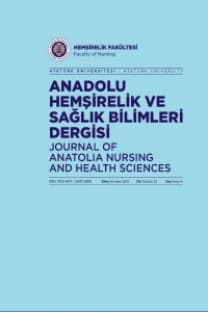Holistik bakımın bir boyutu: Spiritualite, doğası ve hemşirelikle ilişkisi
A dimension of holistic care: Spirituality, nature and relationship with nursing
___
- Arslan H, Konuk Şener D (2009). Stigma, spiritüalite ve konfor kavramlarının Meleis’in kavram geliştirme sürecine göre irdelenmesi. Maltepe Üniversitesi Hemşirelik Bilim ve Sanatı Dergisi, 2(1):51-58.
- Baldacchino D, Ross L (2007). Spirituality: The human dimesion in care, Proceedings 3rd International Students Conference, 25th-26th October, Salina Bay, Malta.
- Baldacchino DR (2006). Nursing competencies for spiritual care. Journal of Clinical Nursing 15(7): 885-896.
- Bash A (2004). Spirituality: the emperor’s new clothes? Journal of Clinical Nursing 13(1): 11–16.
- Carpenter K, Girvin L, Kitner W et al. (2008). Spirituality: A dimension of holistic critical care nursing. Dimens Crit Care Nurs; 27(1):16-20.
- Carroll BA (2001). Phenomenological exploration of the nature of spirituality and spiritual care. Mortality 6(1): 81-98.
- Chung LYF, Wong FKY, Chan MF (2007). Relationship of nurses’ spirituality to their understanding and practice of spiritual care. Journal of Advanced Nursing 58(2):158-170.
- Como JM (2007). Spiritual practice: a literature review related to spiritual health and health outcomes. Holıstıc Nursıng Practıce 21(5): 224-236.
- Cook CCH (2004). Addiction and spirituality. Addiction 99(5): 539-551. Culliford L (2002). Spirituality and clinical care. BMJ;325 (7378): 1434-1435.
- Çetinkaya B, Altundağ S, Azak A (2007). Spiritüel bakım ve hemşirelik. Adnan Menderes Üniversitesi Tıp Fakültesi Dergisi 8(1): 47-50.
- Dyson J, Cobb M, Forman D (1997). The meaning of spirituality: a literature review. Journal of Advanced Nursing 26 (6):1183-1188.
- Ergül Ş, Bayık A (2004). Hemşirelik ve manevi bakım. Cumhuriyet Üniversitesi Hemşirelik Yüksekokulu Dergisi 8 (1): 37- 45.
- Khorshıd L, Gürol Arslan G (2006). Hemşirelik ve spiritüel bakım. Ege Üniversitesi Hemşirelik Yüksek Okulu Dergisi 22 (1): 233-243. Kostak M (2007). Hemşirelik bakımının spiritüel boyutu. Fırat Sağlık Hizmetleri Dergisi 2(6):105-115.
- Kostak MA, Çelikkalp Ü, Demir M (2010). Hemşire ve ebelerin maneviyat ve manevi bakıma ilişkin düşünceleri. Maltepe Üniversitesi Hemşirelik Bilim ve Sanatı Dergisi, Sempozyum Özel Sayısı. 218-225.
- Ledger SD (2005). The duty of nurses to meet patients' spiritual and/or religious needs. British Journal of Nursing14 (4): 220-225.
- McEwen M (2005). Spiritual nursing care. Holistic Nursing Practice 19(41):161 -168.
- Murray RB, Zentner JP (1989). Nursing Concepts for Health Promotion. London: Prentice Hall Narayanasamy A (1999). ASSET:a model for actioning spirituality and spiritual care education and training in nursing. Nurse Education Today 36(2): 117-25.
- Narayanasamy A, Owens J (2001). A critical incident study of nurses’responses to the spiritual needs of their. Journal of Advanced Nursing 33(4): 446-455.
- Oldnall A (1996) A critical analysis of nursing: meeting the spiritual needs of patients. Journal of Advanced Nursing 23(1): 138-144.
- Ormsby A, Harrington A (2003) The spiritual dimensions of care in military nursing practice. International Journal of Nursing Practice 9(5):321-327.
- Öz F (2004) İnsan, spiritual gereksinimler ve hemşirelik. Klinik Bilimler & Doktor 10(3):266-273.
- Sawatzky R, Pesut B (2005). Attributes of spiritual care in nursing practice. Journal of Holıstıc Nursıng 23(1): 19-33.
- Sessanna L, Finnell D, Jezewski MA (2007). Spirituality in nursing and health-related literature. a concept analysis. Journal of Holistic Nursing 25(4): 252-262.
- Seybold KS, Hill PC (2001). The role of religion and spirituality in mental and physical health. American Psychological Society 10(1): 21-24.
- Tanyi RA (2002). Towards clarfication of the meaning of spirituality. Journal of Advanced Nursing 39(5): 500-509. Van Leeuwen R, Tiesinga LJ, Post D et al. (2006). Spiritual care: implications for nurses’ professional responsibility. Journal of Clinical Nursing 15, 875-84.
- Wong KF, Yau SY (2009). Nurses' experiences in spirituality and spiritual care in Hong Kong. Applied Nursing Research 23(4):242-244.
- Yılmaz M, Okyay N (2009). Hemşirelerin maneviyat ve manevi bakıma ilişkin düşünceleri. Hemşirelikte Araştırma ve Geliştirme Dergisi (HEMAR-G) 11(3):41-52
- ISSN: 1309-5471
- Yayın Aralığı: Yılda 4 Sayı
- Yayıncı: Atatürk Üniversitesi Hemşirelik Fakültesi
HEMŞİRELERİN ENTERAL BESLENME İŞLEMİNE YÖNELİK UYGULAMA VE KAYITLARININ İNCELENMESİ
Nurcan UYSAL, İsmet EŞER, Leyla KHORSHİD
Üniversite öğrencilerinin cinsel sağlık ve üreme sağlığı hakkındaki bilgi düzeylerinin belirlenmesi
Meral KILIÇ, Özlem KARABULUTLU
Kendini tanıma ve girişkenlik dersinin hemşirelik öğrencilerinin atılganlık düzeylerine etkisi
Meral KELLECİ, Elvan Emine ATA, Dilek AVCI, Selma DOĞAN
Eksternal fiksatör çivi bölgesi bakımı
Holistik bakımın bir boyutu: Spiritualite, doğası ve hemşirelikle ilişkisi
YENİDOĞAN YOĞUNBAKIM ÜNİTESİNDE YATAN YENİDOĞAN AİLELERİNİN YAŞADIKLARI GÜÇLÜKLERİN BELİRLENMESİ
Kadın mahkumlarda genital hijyen davranışları
Özen KULAKAÇ, İlkay ÖZKAN ARSLAN
KENDİNİ TANIMA VE GİRİŞKENLİK DERSİNİN HEMŞİRELİK ÖĞRENCİLERİNİN ATILGANLIK DÜZEYLERİNE ETKİSİ
Meral KELLECİ, Dilek AVCI, Elvan Emine ATA, Selma DOĞAN, Elvan ATA
ANNELERİN BEBEK BAKIMI UYGULAMARI VE ETKİLEYEN FAKTÖRLER: BİR KAPADOKYA ÖRNEĞİ
Zehra (IŞIK) ÇALIŞKAN, Meral BAYAT
